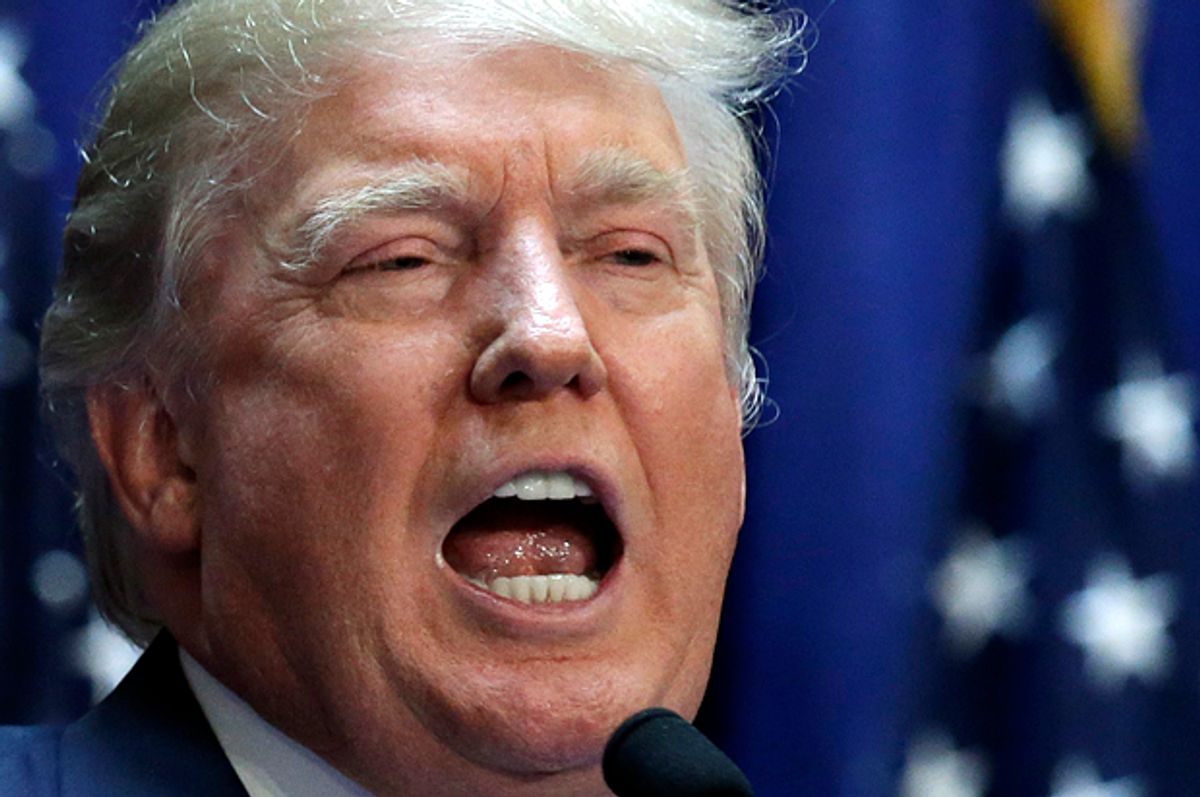Ever since his presidential campaign began in earnest, predicting the end of this whole Donald Trump… thing — phenomenon, bubble, disaster; take your pick — has been a mug’s game. At this point, in fact, the best way to know Trump’s next move may be to find out whatever it is most pundits are expecting; because the complete opposite will probably happen instead.
So I’m not going to join the New Republic’s Jeet Heer in prophesying doom for Trump 2016, not just yet. But I think he’s right to wonder if Trump hasn’t crossed a Rubicon of sorts with his recent attack on Dr. Ben Carson, the retired neurosurgeon and peerless grifter who may snatch the Iowa caucuses from Trump’s hands — and who Trump likened to a “child molester” on Thursday.
“Donald Trump has made a huge mistake,” Heer writes. Not because comparing an opponent to a child molester is beyond the pale — which it obviously is, even for Trump — but because Carson, Heer says, “is far and away the most personally popular candidate in the GOP race.” (That’s true, by the by; a recent poll showed that 71 percent of Republicans view Carson favorably, with only 18 percent seeing him in a negative light.)
Even if they don’t think he should be the next president, in other words, Republicans love them some Ben Carson. And while that isn’t necessarily reason enough for Trump to go easy on the good doctor, the difference between Carson and other recipients of Trump’s bile, Heer writes, is that Republicans want to like Carson — they almost need to like him, in fact. Why? For reasons of both ideology and electoral politics. Heer continues:
[Carson’s] inspiring life story speaks to large constituencies in the party, ranging from evangelical Christians who love tales of redemption, to economic conservatives who treasure Horatio Alger narratives of the poor pulling themselves up by their bootstraps. As a successful black man who supports hard-line conservative policies, he’s a cherished piece of evidence that the GOP is as it claims to be: a party for all races.
As a general description of how Trump is misreading his audience, I think Heer is on the money. (And if you doubt that Republicans care about being perceived as bigoted, just check out how popular the “All the Democratic candidates are white!” talking point is among the #tcot crowd.) But there’s a reason why I’m not quite willing to co-sign his view that the attack on Carson could be Trump’s downfall.
He’s got the basic dynamic right. The problem is, he’s looking at the wrong candidate. Because if anything Trump said on Thursday undoes him, it won’t be his broadside against Carson. It’ll be his equally transgressive attack on Marco Rubio, the Florida senator and pseudo-frontrunner who seems to be the only GOPer who understands how to deal with Trump on his own terms. Rubio “wants amnesty,” Trump said. And he wants it because he’s Hispanic.
If you’ve been closely following the 2016 campaign thus far, you may remember that this isn’t the first time Trump has used race to explain an opponent’s position. Way back during the dog days of summer, Trump posted — and then deleted — a tweet charging Jeb! Bush with supporting immigration reform “because of his wife.” (Bush’s wife is Mexican; and Jeb! subsequently demanded an apology from Trump, which — surprise, surprise — he never got.)
As objectionable as Trump’s attack on Columba Bush was, though, there are two reasons why I think his race-baiting of Rubio is qualitatively different. The first is rather simple: Rubio, unlike Mrs. Bush, is a presidential candidate. So Trump’s attacks on him are inevitably going to get a lot more attention than a tweet about a spouse — especially one that Trump quickly decided to delete (and which the Bush campaign stopped mentioning long ago).
The second reason, however, is of greater importance. It ties back to Heer’s point about Carson, and why he’s someone that GOP voters want to admire. Like Carson, Rubio’s life story checks all the requisite social mobility boxes (and, like Carson’s, it seems to have been at least somewhat embellished). But while Carson helps calm whatever anxieties Republicans have about their party’s relationship with African-Americans, Rubio is a proxy for Hispanics — a more politically significant bloc.
Of course, Rubio is technically no supporter of “amnesty,” either. And despite taking a leading role in getting immigration reform legislation through the Senate, he’s since disowned the bill and effectively promised that he won’t consider supporting a pathway to citizenship as president. Still, Rubio’s political brand is interwoven with his past support for reform, as well as the general idea that he can appeal to the country’s fast-growing Hispanic population.
To put it simply, no Republican wants to see Rubio defeated in a way that could be chalked up to his race — except, that is, for those who are in Trump’s corner already. This is undoubtedly true among the so-called establishment (which has proven utterly incapable of controlling Trump). But I’d suspect that it’s true for many at the grassroots level, too. None of them want to see Trump make it easier to dismiss the GOP as a beige melange of plutocrats and racists.
Trump is playing with fire here. And he's resurrecting what was once seen as perhaps his greatest weakness — namely, the suspicion that he’s a fair-weather Republican at best; that he’s not a team player; that he’s only in it for himself. If he’s not careful, any victory he secures over Rubio could ultimately be pyrrhic. Then again, there’s a chance that this jolt of racism is just what Trump 2016 needed. I wouldn’t be the first pundit to whiff when it comes to Donald Trump.

Shares